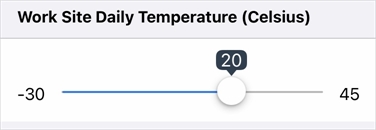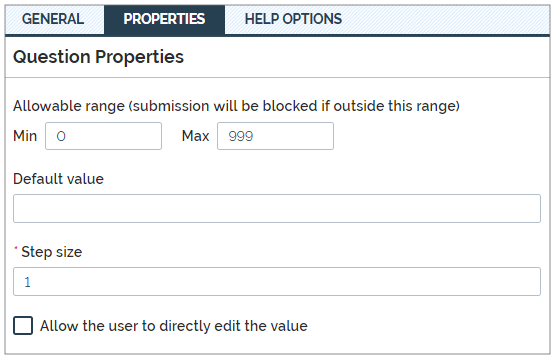Question Type: Stepper and Slider
Available on all tiers, with more options on the Advanced and Enterprise tiers:
Contents
About
Allow users to quickly select answers using a stepper/slider control with predetermined ranges and intervals. This is useful when the expected answer exists in a predictable range or on a set interval, such as a cost range, temperature, or time.
Examples of both question types on an iOS device is shown below:
Stepper:
Slider:
- Stepper and Slider questions can save your mobile users time over a numeric text field when used correctly.
- Stepper: Steppers are extremely useful for things that your users would count, and where the likely range of options is close to the default. Often, the motion of the tap plays well with human counting habits. An example of a good use case for the stepper is counting objects when filling out a form, or for quantities.
- Slider: Sliders are meant for pre-defined ranges where any value within the range is valid. A common use case for slider questions is temperature readings on site inspections. Large ranges are fine, but keep in mind that it can be hard for users to get the precise answer on a large range with a small step size.
- When not to use Stepper or Slider: If your users need precision and have a wide range of valid answers, use a numeric text field.
Form Builder
In the Form Builder, the Stepper and Slider question types appear as shown below. We have used a Stepper question to demonstrate:
The Question Edit screen for the Stepper and Slider question types has three tabs: General, Properties, and Help Options![]() Help Options are ways to add help content, such as YouTube videos, web pages, text, or images, to questions in a form. Mobile users simply tap the help icon next to a question to see the help that the form designer provided.
Help Options are ways to add help content, such as YouTube videos, web pages, text, or images, to questions in a form. Mobile users simply tap the help icon next to a question to see the help that the form designer provided.
General
Unique ID
The Unique ID![]() A Unique ID refers to the specific identifier of a question, form page, form section, or Data Destination. Unique IDs are used as reference points when pulling data for conditional logic, Analytics projects, Data Destinations, and Documents. is the reference for the question. For more information on Unique IDs, read: Overview: Unique IDs. It can either be auto-generated based on the question text, or customized.
A Unique ID refers to the specific identifier of a question, form page, form section, or Data Destination. Unique IDs are used as reference points when pulling data for conditional logic, Analytics projects, Data Destinations, and Documents. is the reference for the question. For more information on Unique IDs, read: Overview: Unique IDs. It can either be auto-generated based on the question text, or customized.
Data Types
Data Types are the kind of information your mobile users will be putting into these questions. Setting a data type forces users to enter the kind of information you want in the correct format. This also ensures that the entered data can be used elsewhere in your business process, whether that's by other questions in the form, or in a data destination.
The Stepper and Slider question types support the following data types:
| Integer | Decimal | Currency | |
| Stepper | ✓ | ✓ | ✓ |
| Slider | ✓ | ✓ | ✓ |
- Make sure your Data Type reflects what kind of information your mobile users will be entering. A lot of Data Destinations
 A Data Destination specifies where to send data from a submitted form. You can use Data Destinations to automate data sharing and storage, routing data to a specific service (such as email or cloud storage) in several different formats. (such as Salesforce or SharePoint List, for example) are extremely picky about data types; fields in those systems may require that you send a particular numeric data type.
A Data Destination specifies where to send data from a submitted form. You can use Data Destinations to automate data sharing and storage, routing data to a specific service (such as email or cloud storage) in several different formats. (such as Salesforce or SharePoint List, for example) are extremely picky about data types; fields in those systems may require that you send a particular numeric data type.
Restrictions
Restrictions control how your mobile users interact with a question. They can be set on the question itself or controlled by Conditional Logic.
The following table shows which restrictions you can set for the question type. Note that:
-
✓ indicates a restriction that you can configure.
-
✓* indicates a restriction that is always on.
-
✘* indicates a restriction that is always off.
| Required | Read-Only | Hidden on Device | Hidden on Reports |
Keep question width to 100% |
|
| Stepper | ✘* | ✓ | ✓ | ✓ | ✓ |
| Slider | ✘* | ✓ | ✓ | ✓ | ✓ |
* Stepper and Slider questions cannot be Required because there is always a value entered—i.e., the question is always answered. If a Default Value is not specified in Properties, the initial answer will be set to 0.
Properties
Properties allow you to set up your question in various ways. Question Properties change depending on the data type chosen.
| Integer/Decimal/Currency |
|
Answer Exceptions and Additional Comments
As Stepper and Slider questions use Numeric Data Types, you will have the option to use Answer Exceptions and Additional Comments.
Answer Exceptions
Available on the Advanced and Enterprise tiers:
Answer Exceptions are used to categorize problems identified during the course of a field technician's work as the user completes a form. For example, if configured on an Inspection form, if a user shifts a Temperature slider to one extreme or another, TrueContext could show a warning containing information on what kind of protective equipment might be needed for that weather.
For more information on setting up Answer Exceptions, please read: Answer Exceptions
Additional Comments
Additional Comments are useful for when certain answers from a user require further information, like a comment or reason. Using the same example as above, if a user adds an excessive number of parts to an Invoice form, a comment could be useful to provide additional details on why that number of parts is necessary.
For more information on configuring Additional Comments on questions, please read: Additional Comments on Questions
Help Options
Available on the Advanced and Enterprise tiers:
Adding "Help" content to forms gives mobile users access to support and other resources out in the field. Help content is available to users through a button embedded beside a question. Any question in the form can include a link to YouTube videos, web pages, or work instructions.
For more information on Help Content, please read: Add Help Options to Questions




